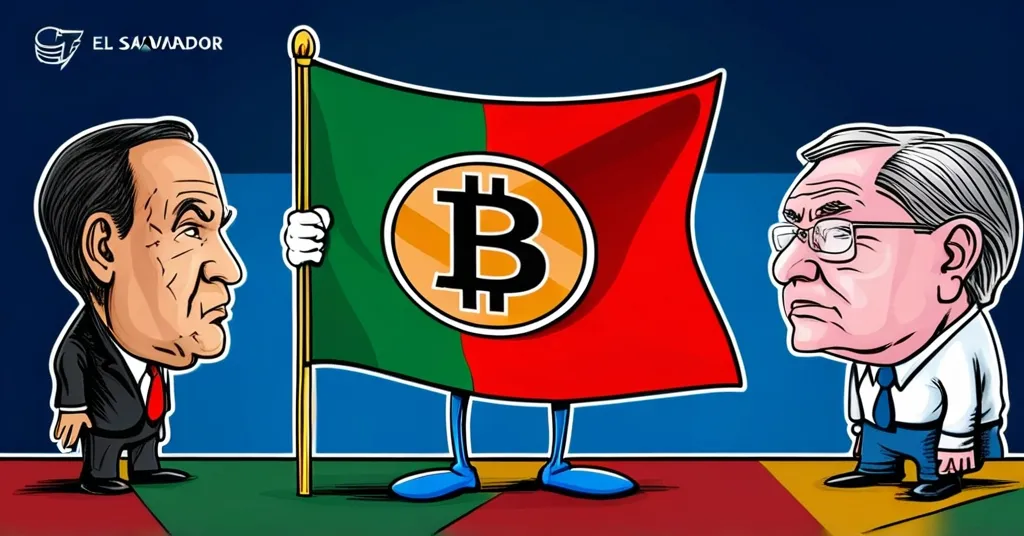El Salvador’s 6,000 BTC Reserves Defy IMF: A Crypto Nation’s Bold Leap Forward

El Salvador’s Bitcoin Boldness: 6,000 BTC Strong Despite IMF Scrutiny
El Salvador’s embrace of Bitcoin continues to make waves, with the nation’s reserves now soaring past 6,000 BTC. This bold statement, despite International Monetary Fund (IMF) skepticism, cements El Salvador’s position as a trailblazer in cryptocurrency adoption and ignites a debate about the future of money and national financial strategies.
- El Salvador holds 6,000.77 BTC, valued at $569.3 million
- 108.02% ROI on Bitcoin investments
- First nation to adopt Bitcoin as legal tender in 2021
- Plans to accelerate Bitcoin purchases despite IMF warnings
Since making history on September 6, 2021, by becoming the first country to declare Bitcoin (BTC) as legal tender, El Salvador has not shied away from its cryptocurrency ambitions. Under President Nayib Bukele’s leadership, the country now proudly holds 6,000.77 BTC, a reserve valued at $569.3 million at current market rates. This achievement places El Salvador sixth globally in Bitcoin holdings, trailing only the United States, China, the United Kingdom, Ukraine, and Bhutan. This ranking signifies that, despite being a small nation, El Salvador is punching above its weight in the global financial arena, challenging the dominance of traditional currencies.
The return on investment (ROI) for El Salvador’s Bitcoin foray stands at an impressive 108.02%, with an average purchase price of $45,450 per BTC. This success story, however, unfolds against a backdrop of cautionary tales from the IMF, which has expressed concerns about the potential risks of cryptocurrency investments to the nation’s financial stability. The IMF’s skepticism is understandable, given the volatility of Bitcoin, but El Salvador seems undeterred.
Despite these warnings, El Salvador’s commitment to Bitcoin remains unwavering. On the heels of securing a $1.4 billion deal with the IMF, the country boldly acquired $1 million worth of Bitcoin, and did so again on December 22. This steadfast approach is echoed by Stacy Herbert, Director of El Salvador’s national bitcoin office, who declared, “The country would keep buying Bitcoin at an ‘accelerated pace.'” It’s like El Salvador is playing financial poker with Bitcoin as its ace, and they’re not afraid to go all in.
Herbert also shed light on future plans for the country’s digital wallet infrastructure. “Private Bitcoin wallets will ‘continue serving El Salvador’ and that El Salvador’s Chivo wallet ‘will be sold or wound down,'” she stated. This shift toward empowering individuals with more control over their digital assets is significant. The transition from the government-backed Chivo wallet to private solutions underscores the complexities of implementing such a radical financial strategy. It’s a move that could enhance financial sovereignty—the ability of a country to control its own financial policies and assets without external influence—but it also raises questions about the ease of use and security for everyday users.
The tension between El Salvador’s Bitcoin strategy and the IMF’s cautious outlook presents a fascinating case study in the real-world application of cryptocurrencies in national policy. The IMF, while nearing approval of the $1.4 billion deal, remains skeptical of El Salvador’s Bitcoin policies, suggesting a reduction in cryptocurrency activities to safeguard the economy. El Salvador’s Bitcoin fervor is clearly ruffling feathers at the IMF, which is waving a red flag over the nation’s crypto gamble.
Yet, El Salvador’s narrative is not just about defying international critique; it’s about pioneering a financial revolution. The country’s actions resonate with the ethos of decentralization and freedom, pushing the boundaries of what’s possible in a world dominated by traditional financial systems. It’s a testament to the belief in Bitcoin’s potential to transform economies, even if it means navigating the choppy waters of global finance and economic volatility.
However, this journey is not without its pitfalls. The volatility of Bitcoin poses real fiscal risks, and the modest impact of its adoption on El Salvador’s economy so far raises questions about its long-term viability as a national currency. Critics argue that while Bitcoin’s potential is undeniable, its practical application as a currency remains challenging due to its price swings and limited adoption in everyday transactions. Yet, advocates point to the potential for financial inclusion and the empowerment of citizens through direct control of their assets.
El Salvador’s story is a compelling narrative in the ongoing saga of cryptocurrency adoption. It highlights the potential for Bitcoin to drive financial inclusion and stimulate economic growth, while also serving as a cautionary tale about the challenges of integrating volatile assets into national economies. The country’s bold moves could inspire other nations to follow suit, but the path forward is fraught with uncertainty.
As we watch El Salvador’s Bitcoin journey unfold, it’s clear that the country is not just investing in a cryptocurrency but in a vision of the future where financial sovereignty and innovation lead the way. Whether this vision will withstand the pressures of international finance and economic reality remains to be seen, but one thing is certain: El Salvador is not backing down from its Bitcoin bet.
Key Takeaways and Questions:
- What is the current value of El Salvador’s Bitcoin holdings?
The current value of El Salvador’s Bitcoin holdings is $569.3 million.
- How many Bitcoins does El Salvador currently hold?
El Salvador currently holds 6,000.77 Bitcoins.
- When did El Salvador declare Bitcoin as legal tender?
El Salvador declared Bitcoin as legal tender on September 6, 2021.
- What is the return on investment for El Salvador’s Bitcoin purchases?
The return on El Salvador’s Bitcoin investment is 108.02%.
- What is the IMF’s stance on El Salvador’s Bitcoin strategy?
The IMF has expressed concerns and suggested that El Salvador reduce its Bitcoin activity, citing potential risks to the country’s financial stability.
- What are El Salvador’s plans regarding future Bitcoin purchases?
El Salvador plans to continue purchasing Bitcoin at an accelerated pace.
- What is the status of El Salvador’s Chivo wallet?
The Chivo wallet may be sold or wound down, with a shift toward private Bitcoin wallets.
- How does El Salvador rank globally in terms of Bitcoin holdings?
El Salvador ranks sixth globally in Bitcoin holdings, following the US, China, UK, Ukraine, and Bhutan.
- What are the potential risks of a nation adopting Bitcoin?
The volatility of Bitcoin poses fiscal risks, and its limited adoption in everyday transactions can hinder its effectiveness as a national currency.
Glossary of Terms:
- BTC (Bitcoin): A decentralized digital currency that enables direct peer-to-peer financial transactions without intermediaries like banks.
- ROI (Return on Investment): A performance measure used to evaluate the efficiency of an investment or compare the efficiency of different investments.
- Financial Sovereignty: The ability of a country to control its own financial policies and assets without external influence.



